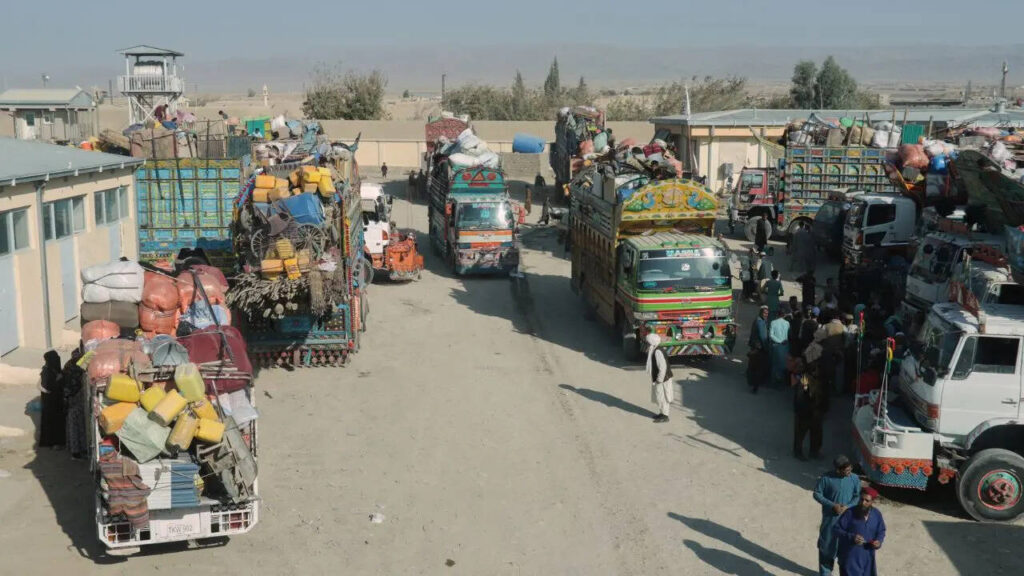Trucks parked near the closed Spin Boldak border crossing with Pakistan, after the border was shut following clashes between Afghan and Pakistani forces. (Photo: AP)
Photo : AP
Pakistan and Afghanistan have finally agreed to uphold a ceasefire following peace talks in Istanbul, Turkey’s Foreign Ministry announced on Thursday, after earlier discussions between the two sides had collapsed earlier in the week.
According to a statement issued on behalf of Pakistan, Afghanistan, Turkey and Qatar, the two countries will meet again in Istanbul on 6 November for a higher-level meeting to finalise the ceasefire’s implementation.
“All parties have agreed to put in place a monitoring and verification mechanism that will ensure maintenance of peace and imposing penalty on the violating party,” the statement said.
The latest round of talks, facilitated by Turkey and other “friendly nations,” aimed to reduce border tensions that have recently turned deadly. Earlier this month, both sides exchanged fire along their shared border, leaving dozens of soldiers, civilians and militants dead.
While the previous round of negotiations ended without an agreement, a fragile ceasefire has largely held this week, with no new clashes reported. However, major border crossings remain closed, leaving hundreds of trucks carrying goods and refugees stranded on both sides.
The Afghan government spokesman, Zabihullah Mujahid, said Kabul remained committed to diplomacy.
“Just as the Islamic Emirate seeks good relations with other neighboring countries, it also desires positive ties with Pakistan and remains committed to relations based on mutual respect, non-interference in internal affairs, and not posing a threat to any side,” he said.
Pakistan’s Defence Minister, Khawaja Mohammad Asif, told Geo News that Islamabad agreed to continue peace efforts “at the request of Qatar and Turkey” and that its delegation was asked to stay in Istanbul after the talks were extended.
Pakistan’s state-run media reported that Islamabad’s main demand remains that Afghanistan take verifiable and effective action against militant groups operating from its territory.
Two senior Pakistani security officials, speaking to the Associated Press on condition of anonymity, said Islamabad had stressed again that Afghan soil must not be used for terrorism against Pakistan, while thanking Turkey and Qatar for their mediation efforts.
Tensions between the two neighbours flared earlier this month after explosions in Kabul, which the Taliban government blamed on Pakistani airstrikes. Afghan officials claimed to have retaliated, saying 58 Pakistani soldiers were killed. Pakistan’s military, however, said 23 of its soldiers died and insisted its operations targeted militant hideouts inside Afghanistan.
The clashes prompted Qatar to host emergency talks, which resulted in a temporary ceasefire on 19 October. Four days of subsequent talks in Istanbul ended without agreement on Tuesday before Turkey and Qatar helped bring the sides back to the table.
On Thursday, Pakistan’s army chief, Field Marshal Asim Munir, told tribal elders in Peshawar that Pakistan sought peace with all its neighbours, including Afghanistan, but warned it “will not tolerate cross-border terrorism from Afghan soil.”
He said Pakistan had shown restraint and pursued diplomatic and economic outreach, but accused the Taliban government of continuing to support the Tehrik-e-Taliban Pakistan (TTP), which is designated as a terrorist organisation by both the United Nations and the United States.
Pakistan has faced a surge in militant attacks in recent months, many claimed by the TTP. The group, closely allied with the Afghan Taliban, is believed to have leaders and fighters sheltering in Afghanistan since the Taliban’s return to power in 2021.
Separately, Pakistan’s military said it killed 18 militants in two operations in Balochistan and another four Pakistani Taliban, including a “high-value target,” as they attempted to cross into Bajaur, near the Afghan border.



